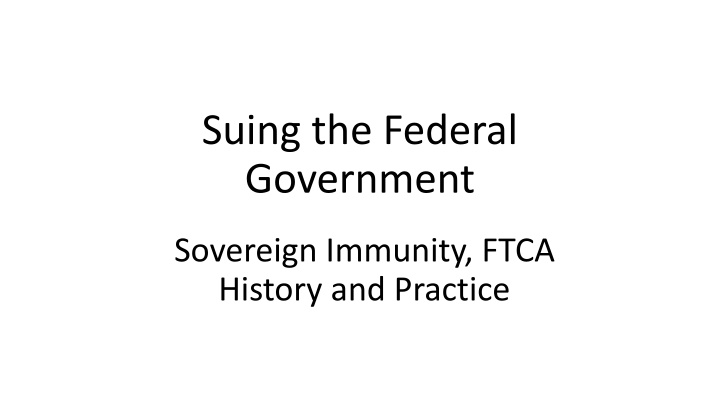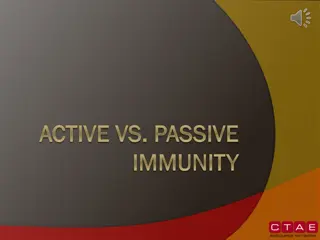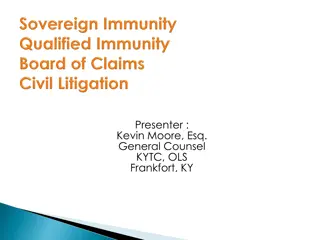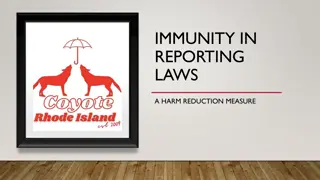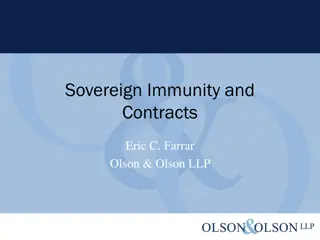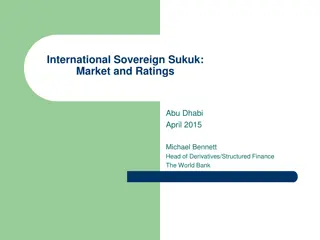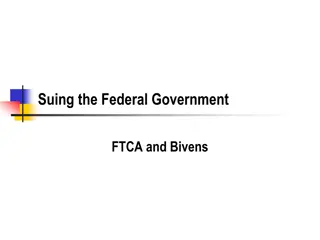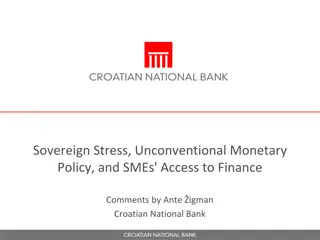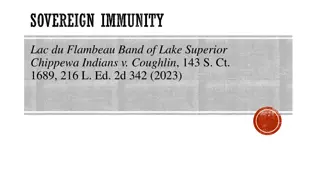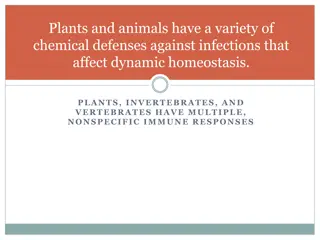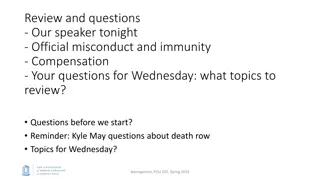Sovereign Immunity and FTCA History
Sovereign immunity is a key legal concept derived from common law and enshrined in the US Constitution to protect the government from certain legal actions. The Federal Tort Claims Act (FTCA) plays a crucial role in regulating claims against the federal government. Learn about the jurisprudential basis of sovereign immunity, limitations imposed by the 5th Amendment, and the formation of the Court of Claims to address such legal matters.
Download Presentation

Please find below an Image/Link to download the presentation.
The content on the website is provided AS IS for your information and personal use only. It may not be sold, licensed, or shared on other websites without obtaining consent from the author.If you encounter any issues during the download, it is possible that the publisher has removed the file from their server.
You are allowed to download the files provided on this website for personal or commercial use, subject to the condition that they are used lawfully. All files are the property of their respective owners.
The content on the website is provided AS IS for your information and personal use only. It may not be sold, licensed, or shared on other websites without obtaining consent from the author.
E N D
Presentation Transcript
Suing the Federal Government Sovereign Immunity, FTCA History and Practice
What is Sovereign Immunity? Derives from the old common law maxim that the King can do no wrong. Expressed in the US Constitution as a protection of the public purse: "No Money shall be drawn from the Treasury, but in Consequence of Appropriations made by Law." U.S. Const. Art. I, 9. There is a parallel provision in the Louisiana Constitution. 2
The Jurisprudential Basis of Sovereign Immunity The traditional policy rationale is that governments need to be free to make decisions which benefit the many at the expensive of the few. The jurisprudential rationale is separation of powers the legislature, not the courts should control the financial liability of the government. 3
The 5th Amendment Limitation on Sovereign Immunity The Takings Clause nor shall private property be taken for public use, without just compensation. 5th Amendment This creates a constitutional right to compensation when the government takes property. This is an exception to the Appropriations Clause because it is a subsequent amendment to the Constitution. 4
Private Bills Private bills are legislation that appropriates money to pay claims to specific individuals. This was the first method to play claims against the government. Originally Congress determined the merit of the claims and the amount to be paid. What problems might arise from private bills? Congress retains the power to pass private bills. 5
Can Congress Waive Sovereign Immunity? Since Congress controls spending, subject to bicameralism and presentment, Congress can effectively waive sovereign immunity by providing money to pay certain claims against the government. Laws in derogation of immunity (limiting immunity) are construed narrowly, since immunity is the constitutional baseline. 6
Formation of the Court of Claims (Now Court of Federal Claims) 1855 Administrative tribunal to regularize the private bill process by reviewing claims and recommending settlements to Congress. Congress later made its decisions binding and created a fund to pay compensation if recommended by the Court. Art I court, not an Art III court 15-year term - like bankruptcy court judges. Appeal is to to the Federal circuit and the United States Supreme Court. 7
Historic Court of Federal Claims Jurisdiction - 28 U.S.C. 1491 Claims for just compensation for the taking of private property Refund of federal taxes Military and civilian pay and allowances, and Damages for breaches of contracts with the government. Only money, no injunctions 8
What is Missing from the Court of Federal Claims Jurisdiction? Congress did not include compensation for intentional or negligent tort injuries in the jurisdiction of the Court of Federal Claims. The Takings Clause does not include accidents to property. Property must be intentionally taken, not just damaged. If a Postal Service truck totals your car, that is not a taking. 9
Federal Tort Claims Act History and Procedure
Federal Tort Claims Act Passed in 1946 All tort compensation was paid by private bills before then, if it was paid at all. Tied up Congress and encouraged corruption. Provides an agency based administrative compensation adjudication for tort injuries. The agency decision on compensation is appealable to the federal district court. In torts claim litigation you are appealing the agency decision to not compensate your client; you are not directly litigating the tort claim. Thus there is no jury. 11
Who Adjudicates the Initial Claim? The head of each Federal agency ... may consider, ascertain, adjust, determine, compromise, and settle any claim for money damages against the United States for injury or loss of property or personal injury or death caused by the negligent or wrongful act or omission of any employee of the agency 12
What are the Tort Standards? There is no systematic federal tort law remember Erie? Looks to the law of the state where the tort occurred for the standards for the tort: under circumstances where the United States, if a private person, would be liable to the claimant in accordance with the law of the place where the act or omission occurred 2672 Includes state tort reform limits. If the state caps damages or provides additional defenses, these also apply in tort claims actions. 13
Who is the Defendant in an FTCA Case? A primary purpose of the FTCA is to protect federal employees from personal liability. Congress does not want employees making decisions based on liability fears. If you sue an individual, the government is substituted for the individual. Does not apply if the employee is acting beyond course and scope of employment. Then you have to sue the employee directly. 14
Limitations on Liability - Sec 2674 The United States shall be liable, respecting the provisions of this title relating to tort claims, in the same manner and to the same extent as a private individual under like circumstances, but shall not be liable for interest prior to judgment or for punitive damages. [special provisions for death cases no longer relevant] No strict liability No intentional torts in the original version. 15
Other Exceptions in the FTCA (f) Any claim for damages caused by the imposition or establishment of a quarantine by the United States. (j) Any claim arising out of the combatant activities of the military or naval forces, or the Coast Guard, during time of war. [Just warlike behavior, there does not need to be a declared war.] (k) Any claim arising in a foreign country. There are several agency specific exceptions. 16
What is the Effect of an Exception? Remember, statutes in derogation of immunity are construed narrowly. The FTCA waived immunity. If an action is exempted from FTCA coverage, then immunity is not waived. There is no liability unless the tort claim falls under the coverage of the tort claims act. 17
Intentional Torts - Bivens v. Six Unknown Named Agents, 403 U.S. 388 (1971) Federal agents broke into plaintiff s home and handcuffed him without a warrant. The court recognized that the exclusionary rule is worthless to an innocent man. The court reasoned that a constitutional right with a remedy was meaningless. They have since abandoned that reasoning. Intentional torts were excluded from the FTCA, so the court created a federal constitutional tort remedy for damages. 18
Limitations of Bivens Direct action against the individual employees for violations of constitutional rights intentional torts - not covered by the FTCA. Not an action against the government. No vicarious liability. You must show supervisors know and support the actions that caused the injury. They are also sued individually Bivens is not an action against the Government. Created a flood of claims. 19
Congress Responded by Amending Section (h) Provided, That, with regard to acts or omissions of investigative or law enforcement officers of the United States Government, the provisions of this chapter and section 1346(b) of this title shall apply to any claim arising, on or after the date of the enactment of this proviso, out of assault, battery, false imprisonment, false arrest, abuse of process, or malicious prosecution. For the purpose of this subsection, "investigative or law enforcement officer" means any officer of the United States who is empowered by law to execute searches, to seize evidence, or to make arrests for violations of Federal law. 20
The Impact of the New 2680(h) Has become a substitute for a Bivens action for covered officers. The intentional torts of non-law enforcement employees are not covered by the FTCA. medical personnel in a detention center were found liable under Bivens for conscious indifference to a prisoner s medical needs. The Supreme Court has refused to extend Bivens to claims outside of the original Bivens cases which also fall outside of the FTCA. 21
Who Pays Bivens Claims? Research shows that while Bivens is a personal action for intentional torts, the government almost always pays the damages in successful claims because the employees are within course and scope of employment. 22
Form 95 24
What Constitutes a Properly Filed Claim? A claim shall be deemed to have been presented when a federal agency receives from a claimant, his duly authorized agent, or legal representative, an executed standard form 95 or other written notification of an incident, accompanied by a claim for money damages in a sum certain for injury to or loss of property, personal injury, or death alleged to have occurred by reason of the incident. The claim must be presented to the appropriate federal agency within two years after the claim accrues.(Form 95) 27
FTCA Claim v. Complaint in Federal Court Record review adjudication by the agency, not an oral hearing. Must provide enough info on the facts to allow the agency to investigate the claim. Does not put the agency on notice for other facts. The statute of limitations runs on facts not relied on in the claim. Must provide a specific dollar claim as opposed to a general demand in excess of jurisdiction. 28
Can You Go Directly to Court, without Filing a Claim? An action shall not be instituted upon a claim against the United States for money damages for injury or loss of property or personal injury or death caused by the negligent or wrongful act or omission of any employee of the Government while acting within the scope of his office or employment, unless the claimant shall have first presented the claim to the appropriate Federal agency and his claim shall have been finally denied by the agency in writing and sent by certified or registered mail. 29
What if You Go to Court without Filing a Claim with the Agnecy? Jurisdiction is contingent on following the administrative requirements. We discuss this in administrative law as exhaustion of remedies. If you do not follow the statute before going to court, your claim will be dismissed. Since you do not have jurisdiction unless you comply with the statute, there is little room for the court to create equitable exceptions. 30
What if the Agency Ignores Your Claim? The failure of an agency to make final disposition of a claim within six months after it is filed shall, at the option of the claimant any time thereafter, be deemed a final denial of the claim for purposes of this section. 31
What are You Litigating in District Court? You are technically litigating the denial of your claim by the agency. You have to plead your compliance with the statute as part of your statement of jurisdiction. Otherwise, the complaint looks like a torts action. While you can have multi-party litigation, you cannot have class actions. 32
Federal Tort Claims Act The Fundamental Difference between FTCA Cases and Private Tort Cases
Dalehite v. U.S., 346 U.S. 15 (1953) What Does Discretionary Function Immunity (DFE) Mean? 34
The Texas City Disaster - 1947 http://www.local1259iaff.org/disaster.html 35
Dalehite v. U.S., Southern Dist. Texas, Unreported Two ships carrying a government cargo of ammonium nitrate fertilizer explode in the Texas City Harbor. The fertilizer is being shipped to Europe as part of the Marshall Plan. More than 500 dead, thousands injured, and massive property destruction 8,500 claimants 36
The General Claim The negligence charged was that the United States, without definitive investigation of the properties of Fertilizer Grade Ammonium Nitrate (FGAN), shipped or permitted shipment to a congested area without warning of the possibility of explosion under certain conditions. Litigated as a claim over the handling of a hazardous product. 39
The Discretionary Function Exception (DFE) to Liability in the FTCA (a) Any claim based upon an act or omission of an employee of the Government, exercising due care, in the execution of a statute or regulation, whether or not such statute or regulation be valid, or based upon the exercise or performance or the failure to exercise or perform a discretionary function or duty on the part of a federal agency or an employee of the Government, whether or not the discretion involved be abused. 40
Specific Findings by the Trial Court the Government had been careless in drafting and adopting the fertilizer export plan as a whole, specific negligence in various phases of the manufacturing process, and those which emphasized official dereliction of duty in failing to police the shipboard loading. These resemble res ipsa loquitur claims because there were no clear standards for duty for this hazardous product. 41
The Trial Court Ruling In a pattern we will see in future cases, there is a huge trial record 20,000+ pages and exemplar trials using representative plaintiffs. The trial court found that the United States was liable under the FTCA for the damages caused by its negligence. 42
In re Texas City Disaster Litig., 197 F.2d 771 (5th Cir. 1952) In a relatively brief opinion, the 5th Circuit found that the plaintiffs claims did not point to specific acts of negligence by the government, such as accidently starting a fire. Instead, the court found that the trial court had found the government s decisions in how to manage the shipments to be negligent. The court found that these were barred by the Act and the case was appealed to the Supreme Court. 43
Dalehite v. U.S., 346 U.S. 15 (1953) The key question before the Court is the meaning of the DFE. Is the DFE a narrow defense for specific statutory or regulatory duties? Is the DFE a broad protection of the government for all discretionary acts? Is the government only liable for not doing actions required by statutes or regulations? 44
What did the Court say about Ordinary Torts and the DFE?? So we know that the draftsmen did not intend it [DFE] to relieve the Government from liability for such common-law torts as an automobile collision caused by the negligence of an employee of the administering agency.
Is the DFE Limited to Statutory Duties? We know it was intended to cover more than the administration of a statute or regulation because it appears disjunctively in the second phrase of the section. 46
What Type of Discretion is Being Protected? The "discretion" protected by the section is not that of the judge -- a power to decide within the limits of positive rules of law subject to judicial review. It is the discretion of the executive or the administrator to act according to one's judgment of the best course, a concept of substantial historical ancestry in American law. This relates to the agency discretion in Chevron. 47
What is the Intent of the DFE? One only need read 2680 in its entirety to conclude that Congress exercised care to protect the Government from claims, however negligently caused, that affected the governmental functions. The bill is not intended to authorize a suit for damages to test the validity of or provide a remedy on account of such discretionary acts even though negligently performed and involving an abuse of discretion. 48
The United States Supreme Court Ruling The Court found that the decisions on handling the storage and shipping of the FGAN, and handling the fire were discretionary choices by the government. Had these decisions been made by a private party, there might have been liability if the decisions were shown to be negligent. But there is no liability for government decisionmaking, even when it is wrong or in bad faith.
Allen v. United States, 816 F.2d 1417 (10th Cir. 1987) What if the government injures you on purpose? 50
